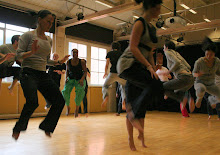“Improvisation helps directors and actors to explore beneath and between the
character's lines of dialogue.” (Polsky.E. Milton, 1997 p316)
By researching in terms of improvisation and play, it has allowed individuals to explore common similarities and differences within Porto. This in turn, adds new physical vocabulary for characters and to the piece itself. Opportunities have arrived for some, where there are larger risks factors and some key moments were characters develop. As a result, leaving the greater impact on the assemble work emotionally and physically. One could only image how visually breath taking this is and therefore shaping the product is probably more important than the action it’s self. The piece is completely reliant on visuals, hence the urgency for structure and shaping is imperative to the process of the production. As it requires all details whether minor or large to be precise, so that the signs within a piece are successfully delivered to its audience. After all, the receiver of the art is in some way a creator as she or he will decide what the performance is saying emotionally and physically, which is why shaping is crucial to the interpretation of the reader.
Porto started off based on the idea of travel and baggage, how individuals deal with load. Porto has now moved on to represent more than that, it now shows how individuals define who they are through the use of others and their baggage. In this sense Porto doesn’t sit far from the world as we know it, as humans constantly try to find out who they are through oppositions and similarities. Poststructuralism and international relations by Jenny Edkins explains that “Language is a system of interdependent terms in which the value of each term results solely from the simultaneous presence of the others...”(1999 p.24) Although she is concerned with literature, the quote reinforces that individuals exist purely through the existence of others, in other words, we are fragmentations of a whole and cannot exist alone. This is how the community of Porto is built and individuality exits. Similarly, Litz Pisk explains that in terms of air, rhythm, beat, awareness and others you as a performer “[...] make their existence present in your own and widen the possibilities of communication.”(The Actor and His Body 1975 p.12). As a whole, it has a constant reminder of relationships, how they are built, sustained and then broken, for me this reinforces the eternal stay within Porto and that the journey is everlasting. Therefore representing, that life experiences are everlasting because humans continue the pattern.
Emotionally my character has hugely developed from the shy intimidating person she was within Porto. The research has help my character form new groups in which she used to add to the physical language she holds. Although she is still aware of possible dangerous around her, it is in her attempts to explore others, where physically, she will develop. There have been occasions where she tries to be assertive, but this is as far as she is willing to go, unlike others her focus and concern is internal. Her choices to interact are therefore when she fells fit to, which can at times stifle the physicality. Looking back at the character that was, seems strange about the character that is, even from costume. The researching has strangely allowed the birth of the character, forming likes and dislikes whereas the scoring has allowed all characteristics to be put into practice. Scoring has altered the pace of movement which in turn will change the body’s expression, but it is to the process I must give credit to because without that my character would not have been able to respond appropriately. Pisk throws light onto my thoughts, stating “You inhabit your body by your presence in it and by your awareness of it. […] connect yourself with your body and feel for an inner rightness.”
Although altered my character has still been true to who she is and wants to communicate to others and has been shown through emotion and physicality.
Bibliography
Edkins.J, Poststructuralism & International Relations:Bringing the Politics Back in.Lynne Reinner;1999.
Milton.E. Polsky, Lets Improvise: Becoming Creative, Expressive and Spontaneous Through Drama. Applause;1997
Pisk.L, The Actor and His Body.Harrap, London;1975.
Yesterday

Jasmin Vardimon Company

